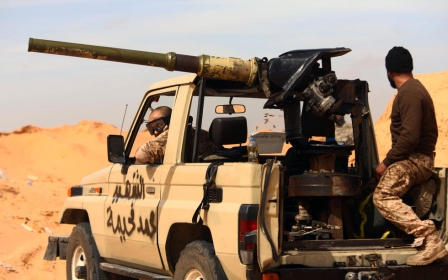Libyan air force bombs fuel vessel near IS-controlled town

TRIPOLI - A fuel vessel docked at a power plant on the outskirts of Sirte was attacked by the Libyan air force on Sunday.
The attack ignited a blaze on the vessel that spread throughout the ship’s accommodation, destroying the command bridge and injuring three crew members. Sirte, the second largest town in Libya, is now under the control of Islamic State (IS) fighters.
Saqr al-Jaroushi, head of the Libyan air force operating under the internationally recognised government and parliament in eastern Libya, said that the Libyan-owned vessel – Anwaar Afriqya – had been carrying mercenaries, weapons and ammunition to fighters in Sirte.
The power plant is under the control of Libya’s rival, Tripoli-based government, and one of its armed units – Brigade 166 – has been battling IS militants in Sirte since mid-February.
Forces loyal to the rival governments have continued to fight each other on several frontlines, while also battling IS’s growing presence in Libya, where it now controls three towns. The Tobruk-based government has been targeting IS in the eastern town of Derna.
The National Oil Corporation (NOC) said the Anwaar Afriqya was transporting 40,000 litres of diesel from Greece to fuel the al-Khalej steam power station, 30 kilometres west of Sirte.
Senior maritime expert Captain Omar Fanoush told Middle East Eye: “The crew made incredible efforts to keep the cargo tanks cool until support vessels arrived from Misrata at around midnight.”
The fire was brought under control at 4am on Monday morning with no damage to the diesel cargo, avoiding what the General Electric Company of Libya (GECOL) had threatened could be an environmental disaster.
Although the Anwaar Afriqya was moored at one of the Al-Khalij’s discharge buoys, the power plant was not damaged in the attack, said NOC spokesperson Mohamed Harari.
Jaroushi claimed that the vessel had been unflagged and had ignored warnings before being targeted by Libyan air force jets. However, the Libyan-owned vessel – one of seven product carriers operated by the Libyan General Maritime Transport Company – had been sailing under the Libyan flag, Captain Fanoush said.
A Sirte resident said the incident had confused local people, who are already living under the dual threat of IS control and bombardment by Tripoli-government forces locked in clashes with the IS militants occupying former dictator Muammar Gaddafi’s former hometown.
“The Libyan army claims to be against ISIS but instead it is now attacking civilian infrastructure,” he said, speaking on condition of anonymity. Despite the ongoing assault on IS in Sirte by Brigade 166, its presence in the town was getting stronger by the day, buoyed by foreign fighters, the resident claimed.
Anwaar Afriqya is the second vessel attempting to dock in IS-controlled territory to be targeted by the Libyan air force this month. A Turkish cargo ship was bombed on 11 May off the coast of Derna – another IS stronghold in Libya – after apparently failing to respond to radio messages or warning fire from anti-aircraft guns. One officer was killed and another crew member injured in the attack, which the Turkish government condemned as a violation of international law.
The Libyan air force has renewed its warning – first announced late last year – to ships not to enter Libyan waters without obtaining prior permission.
In Libya’s civil war, its territorial waters are becoming the new battleground, with the Tripoli-based government allegedly sending supplies and personnel to frontlines in Benghazi by boat; and the internationally recognised government in the east trying to stop the illegal import of fighters, weapons and ammunition it claims are being brought from abroad to fuel the conflict.
Since IS has threatened to use the country – just 290 miles from the Italian coast – as a launching point for its activities in Europe, Libyan waters have taken on a renewed importance for the EU.
Stay informed with MEE's newsletters
Sign up to get the latest alerts, insights and analysis, starting with Turkey Unpacked
Middle East Eye delivers independent and unrivalled coverage and analysis of the Middle East, North Africa and beyond. To learn more about republishing this content and the associated fees, please fill out this form. More about MEE can be found here.




